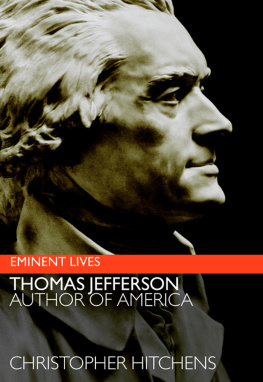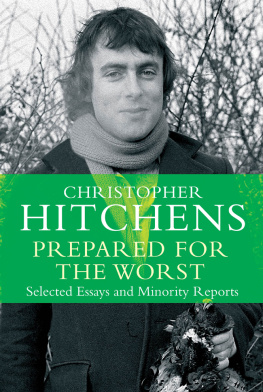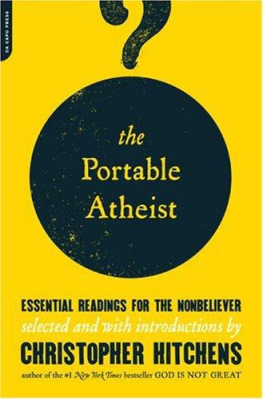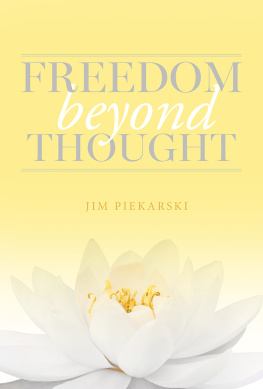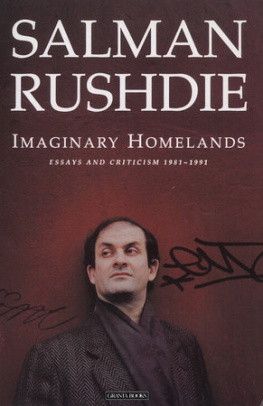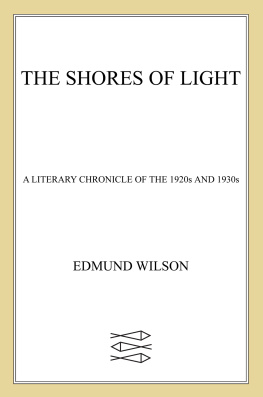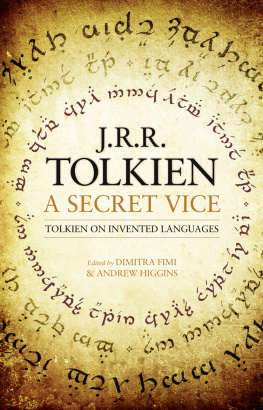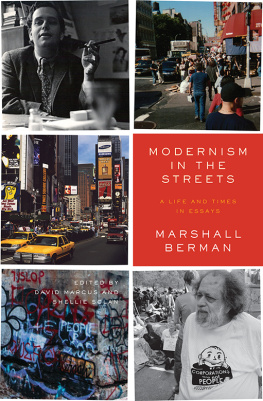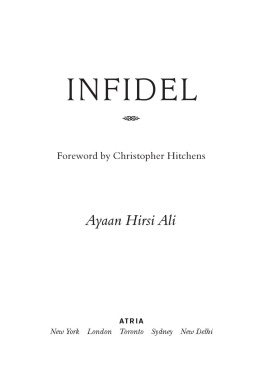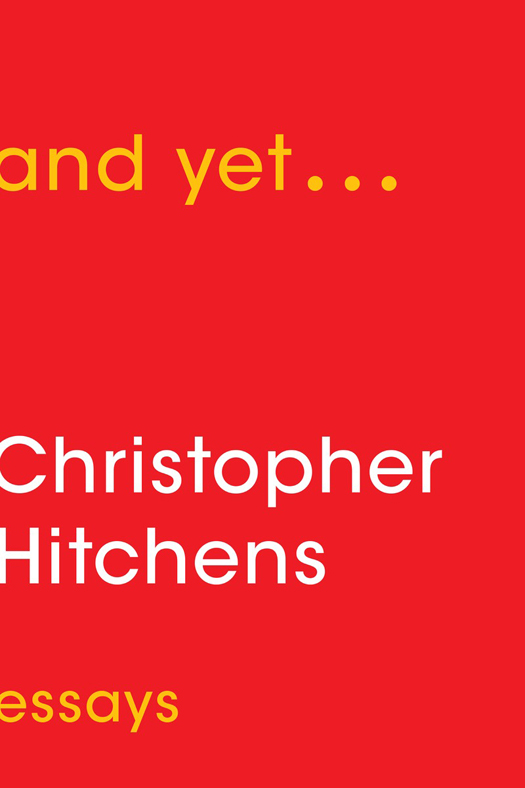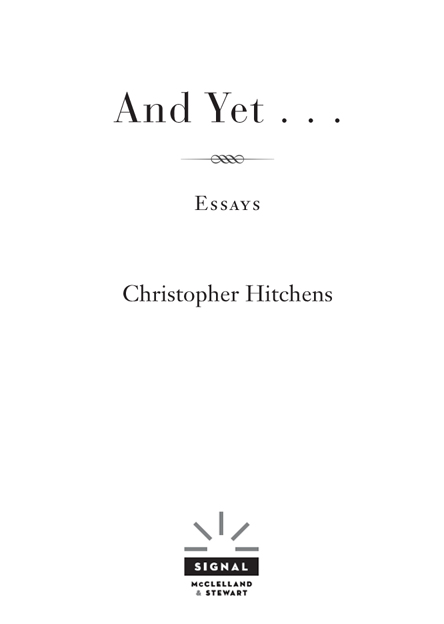ALSO BY CHRISTOPHER HITCHENS
BOOKS
Hostage to History: Cyprus from the Ottomans to Kissinger
Blood, Class, and Nostalgia: Anglo-American Ironies
Imperial Spoils: The Curious Case of the Elgin Marbles
Why Orwell Matters
No One Left to Lie To: The Triangulations of William Jefferson Clinton
Letters to a Young Contrarian
The Trial of Henry Kissinger
Thomas Jefferson: Author of America
Thomas Paines Rights of Man: A Biography
god is Not Great: How Religion Poisons Everything
The Portable Atheist: Essential Readings for the Nonbeliever
Hitch-22:A Memoir
Mortality
PAMPHLETS
Karl Marx and the Paris Commune
The Monarchy: A Critique of Britains Favorite Fetish
The Missionary Position: Mother Teresa in Theory and Practice
A Long Short War: The Postponed Liberation of Iraq
ESSAYS
Prepared for the Worst: Selected Essays and Minority Reports
For the Sake of Argument: Essays and Minority Reports
Unacknowledged Legislation: Writers in the Public Sphere
Love, Poverty and War: Journeys and Essays
Arguably: Essays
COLLABORATIONS
Callaghan: The Road to Number Ten (with Peter Kellner)
Blaming the Victims: Spurious Scholarship and the Palestinian Question (with Edward Said)
When the Borders Bleed: The Struggle of the Kurds (photographs by Ed Kashi)
International Territory: The United Nations, 194595 (photographs by Adam Bartos)
Vanity Fairs Hollywood (with Graydon Carter and David Friend)
Left Hooks, Right Crosses: A Decade of Political Writing (edited with Christopher Caldwell)
Is Christianity Good for the World? (with Douglas Wilson)
Hitchens vs. Blair: The Munk Debate on Religion (edited by Rudyard Griffiths)
Copyright 2015 The Estate of Christopher Hitchens
All rights reserved. The use of any part of this publication, reproduced, transmitted in any form or by any means electronic, mechanical, photocopying, recording or otherwise, or stored in a retrieval system without the prior written consent of the publisheror in the case of photocopying or other reprographic copying, license from the Canadian Copyright Licensing agencyis an infringement of the copyright law.
Signal and colophon are registered trademarks of McClelland & Stewart, a division of Penguin Random House Canada Limited
The essays in this book originally appeared, sometimes in slightly different form, in the following publications: The Atlantic, Foreign Policy, The New York Review of Books, Slate, Vanity Fair, The Wall Street Journal, The Wilson Quarterly.
Library and Archives Canada Cataloguing in Publication is available upon request
ISBN: 978-0-7710-3856-3
eBook ISBN: 978-0-7710-3858-7
Published by Signal,
an imprint of McClelland & Stewart,
a division of Penguin Random House Canada Limited
www.penguinrandomhouse.ca
v3.1
One should strive to combine the maximum of impatience with the maximum of skepticism, the maximum of hatred of injustice and irrationality with the maximum of ironic self-criticism. This would mean really deciding to learn from history rather than invoking or sloganizing it.
from Letters to a Young Contrarian
Che Guevara: Goodbye to All That
W HEN, SHORTLY AFTER the triumph of the Castro revolution, Ernesto Guevara took over the direction of the Cuban National Bank, it became his duty to sign the newly minted ten- and twenty-peso notes. This he did with a contemptuous flourish, scrawling the bold nom de guerre Che on both denominations. By that gesture, which made those bills a collectors item in some quarters of the left, he expressed an ambition to move beyond the money economy and what used to be termed the cash nexus. It was a stroke, at once Utopian and puritanical, that seemed to sum up his gift both for the improvised and the determined.
Revisiting Havana recently, for the purpose of making a BBC documentary on the thirtieth anniversary of Guevaras murder, I discovered that there are now four legal currencies in circulation. The most proud and salient, of course, is the United States dollar. Nowhere outside the Panama Canal Zone has any Latin American economy capitulated so utterly to the usefulness of this green symbol. Once the preserve of the Cuban nomenklatura and of those with access to special diplomatic dollar stores, the money of To Sam is now the preferred streetwise mode of exchange, and also the essential legal tender in hotels and newly privatized restaurants. Next in importance is the special INTUR money, printed by the Cuban Ministry of Tourism for the exclusive use of foreign holidaymakers. Large tracts of Cuba, especially the Varadero beach section outside Havana, have been turned into reservations for this special breed of internationalist. Third comes the peso convertible, a piece of scrip with a value pegged to that of the dollar. And last we find the Cuban peso, a mode of exchange so humble that windshield washers at intersections, when handed a fistful, will wordlessly hand it back.
On this last currency appears the visage of Che Guevara. It certainly, if somewhat ironically, demonstrates the regimes fealty to his carelessness about money. Meanwhile, under stylized poster portraits of the heroic comandante, and within sight of banners readingrather gruesomely, perhapsSocialismo o Muerte, the youth of Havana sell their lissome bodies as they did in the days of the Sam Giancana and George Raft dispensation. Junk tourist artifacts are sold from stalls outside Hemingways old Bodeguita. The talk among the liberal members of the writers union, as also among the American expatriate veterans, is all of the surge in street crime and delinquency. With unintentional comic effect, these conversations mimic their deprived or depraved? counterparts in Los Angeles and New York. Is it the lack of jobs and opportunities? Or could it be the decline in the moral basis of society? After all, its not that long since Martha Gellhorn instructed her readers that mugging in Havana was unknown. The old moral versus material debate continues in a ghostly form, as if there were a pentimento of Che concealed behind the partly gaudy and partly peeling faade.
Leaving Cuba and landing in Cancn, Mexico, I buy the Miami Herald and the New York Times. On the front page of the Herald is the news that Hector Silva, candidate of the Farabundo Mart Liberation Front, has been elected mayor of San Salvador. The paper mentions that many of Silvas enthusiasts still sport lapel buttons bearing the likeness of Guevara. When I interviewed him in 1987, the brave and eloquent Seor Silva was a much likelier candidate for assassination than election.


